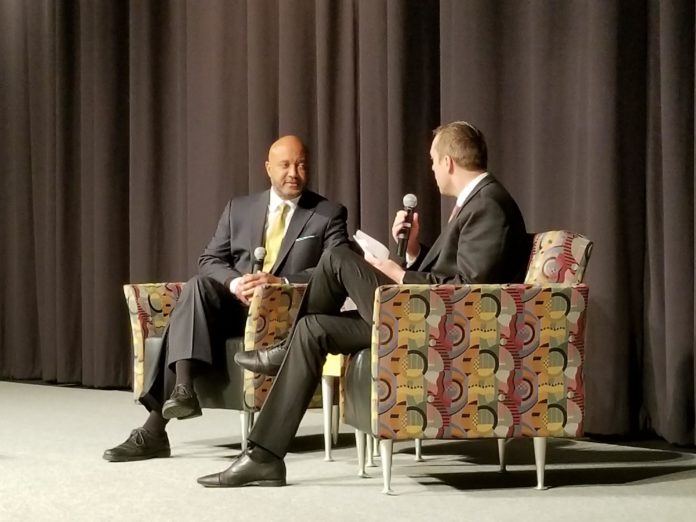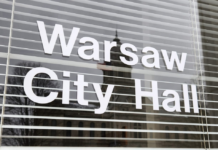
During his 2016 campaign for Indiana Attorney General, Curtis T. Hill Jr. avoided campaigning on the fact that a victory would make him the first black man in Indiana elected to a statewide office — and he even asked reporters to shy away from the issue, saying it was not important.
On Monday — about a year after receiving more votes than any other statewide office holder in Indiana history — he talked openly about racism and injustice in a keynote address at the Martin Luther King Jr. Celebration at the Manahan Orthopaedic Capital Center at Grace College.
The 30th annual event was sponsored by The Committee To Commemorate Martin Luther King.
The former four-term prosecutor from Elkhart County talked about the overt racism his family faced in Elkhart decades ago and a bias that percolated on the campaign trail in 2016.
As he campaigned across the state, people would question if he was actually a Republican and some asked if he was from Lake County.
“Why do you suppose that was?” Hill asked. “I’m not saying that’s racist. But it demonstrates an implicit bias that sometime seethes into attitudes, and depending on who you are on the receiving end, you can let it roll off like I typically do, or some people may be a little more sensitive to those types of issues,” Hill told the audience of nearly 400 people Monday.
Hill told the story of how his father owned two plots of land in Elkhart, a big lot on the south side of town and a small one on the all-white north side of the city. He said neighbors on the north side met with his father and urged him not to build a home there. That meeting, Hill said, was a deciding factor to move to the north side.
He said the family then faced the threat of a bomb and other signs of intimidation after becoming the first family to live north of the railroad tracks.
Hill described his father as the smartest, most courageous man he’s ever known.
“My father is my hero,” Hill said. “This world would be much, much different world if every little boy could say my father is my hero.”
Much of his talk addressed the intersection of race and criminal justice.
He pointed out that blacks represent 35 percent of the prison population, but only make up 13 percent of the nation’s population. He noted that 50 percent of the murder victims are black.
“I don’t believe that’s the freedom we were looking for in our movement,” Hill said “We have something very, very seriously wrong at the core of who we are when we have that level of violence here 50 years after Dr. King’s assassination.”
The country continues to struggle with racial injustice and racial understanding, Hill said.
“As long we remain divided, economically, politically or racially, we can’t be the America the world needs or the world deserves,” Hill said.
Hill discussed the 2014 shooting in Ferguson, Mo., in which a police officer shot and killed a 18-year-old Michael Brown. Hill cast blame for the uprising and violence on people making quick assumptions.
“Ferguson really represents what’s going on in this country, which is misinformation applied to an event that then takes over and becomes cancerous in what it does to our community,” Hill said.
He pointed to the “Hands Up, Don’t shoot” slogan that was borne of the belief that the shooting victim had his hands up when shot — “as if it were fact,” Hill said.
Police were eventually cleared of any wrongdoing.
“Our own justice department went into Ferguson — in my view, prematurely — and there was a lot of emotion and discord and I think we are still suffering a great deal from that,” he said.
He was critical of how people seem quick to invoke racism.
“Not every instance of bias is racism. Racism is a very vile, ugly word, and we have to be careful how we use it,” he said.
Hill’s address came at the same time President Donald Trump faces sharp criticism over his apparent use of a vulgarity in describing Haiti and Africa during a discussion on immigration reform last week. On Sunday, Trump took the extraordinary step of denying his is racist.
After his presentation, Hill chose not to comment on the issue directly, saying he does not know exactly what was said in the meeting.
Speaking more broadly, Hill added, “We have to find ways of moving beyond rhetoric,moving beyond political correctness, as well as insensitivity.”
He said he hopes the nation embraces a more conciliatory tone on topics of race.
Asked if Trump is hurting or helping the existing racial divide in the country, Hill replied, “I think we can all do better.”




